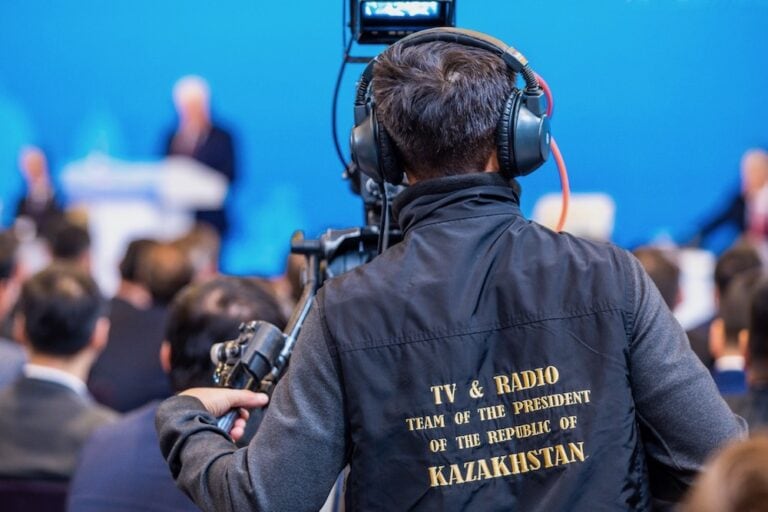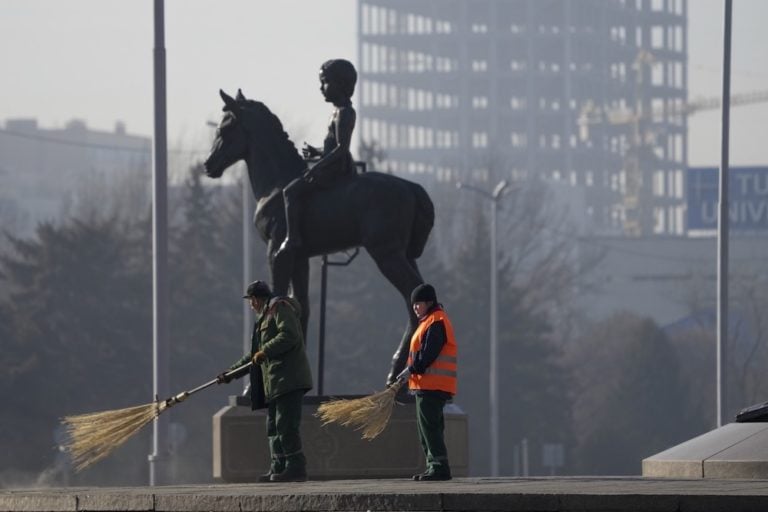Jailed for campaigning for justice, Vladimir Kozlov - journalist, political activist and human rights defender - has long been a thorn in the side of Kazakhstan's authoritarian president.
It is not the one who got sent to jail that is lost, but the one who lost his spirit in jail that is lost.
Journalist, politician and human rights defender, Vladimir Kozlov has long been a thorn in the side of Nursultan Nazarbayev, Kazakhstan’s authoritarian president. On 19 August 2016, after serving four years of a seven-and-a-half year prison sentence, Kozlov was finally released on parole. His release followed years of campaigning by human rights groups who had protested Kozlov’s unfair trial and conviction on trumped up charges of “calling for the overthrow of the constitutional order of the state” and “inciting social hatred.”
Kozlov, 56, has been a vocal advocate for political reform in Kazakhstan for many years. He is a founding member of Alga!, a banned opposition party that seeks to completely transform Kazakhstan into a fully functioning democracy where the International Covenant on Civil and Political Rights is respected. Under Nazarbayev (in office since 1991), Kazakhstan is a country where the freedoms of assembly, speech, and religion are severely curtailed, where opposition newspapers are shut down, where peaceful protesters and genuine political opponents are jailed, and where torture in custody is the norm: it is not difficult to see why the president might have wanted to see Kozlov locked up.
What landed Kozlov in jail was his public campaign for an independent investigation into the bloody massacre by police of at least 15 unarmed striking oil workers in December 2011. In the immediate aftermath of the killings, while the Kazakh authorities cranked up the machinery of repression – arresting journalists and activists across the country, jailing and torturing oil workers – Kozlov travelled to Europe and met with Members of the European Parliament and the European Commission, where he publicly called for an international inquiry into the massacre. In doing so, he caused Nazarbayev huge embarrassment; the president is notoriously sensitive about his international image.
When Kozlov returned to Kazakhstan on 23 January 2012, he was arrested by members of the National Security Committee and placed in detention. He had to wait almost eight months until he was officially charged with “inciting social hatred” and “calling for the overthrow of the constitutional order of the state.” Kozlov denied all the charges, but after a trial that international groups described as unfair, he was convicted in October 2012 and sentenced to seven-and-a-half years in prison. The US embassy in Kazakhstan condemned the conviction, saying that the Kazakh government had used the criminal justice system to “silence opposition voices”.
Kozlov is a resolute, spirited character. Rather than indulging in self-pity, he said that he would make his prison experience as positive as possible; he even joked that he’d use the experience to lose weight.
International outrage at Kozlov’s imprisonment found expression in campaigns by human rights groups calling for his release. In June 2015, the UN Special Rapporteur on the right to freedom of assembly raised concerns about Kozlov’s imprisonment and called on Kazakhstan to consider releasing him early; the European Parliament issued various resolutions condemning his “politically motivated” conviction and sentencing.
Whilst in jail, Kozlov read and shared books that he received from outside with other inmates. He also kept a diary in which he wrote a surprisingly upbeat commentary on his confinement.
But from July 2015, as Kozlov’s eligibility for parole drew closer, his prison experience began to deteriorate. Kozlov had always been a model prisoner, but on 17 July 2015, he was placed in solitary confinement for ten days following alleged threats the authorities claimed he made to prison staff; then, on 27 July, he was ordered to spend a year in a much harsher prison facility where he and 19 others were placed in a barracks measuring only 50-60 square metres, and where phone calls were prohibited, and family visits limited to just three a year.
From December 2015 to February 2016, the Kazakh courts rejected repeated applications by Kozlov to be transferred back into a regular prison facility and to be released on parole. Then, as Kozlov’s health was declining, his request was granted. On 2 August 2016, he was placed back in the general prison population and, on 4 August 2016, the court granted his petition for early release. Eleven days later he was free.
As Kozlov grows accustomed once again to life outside, he is considering what he will do with his freedom. So far, he has made no major announcements, but in a recent interview with Radio Free Europe Radio Liberty he said that he would “continue doing everything to be useful for people.” Prison has not broken his spirit.



